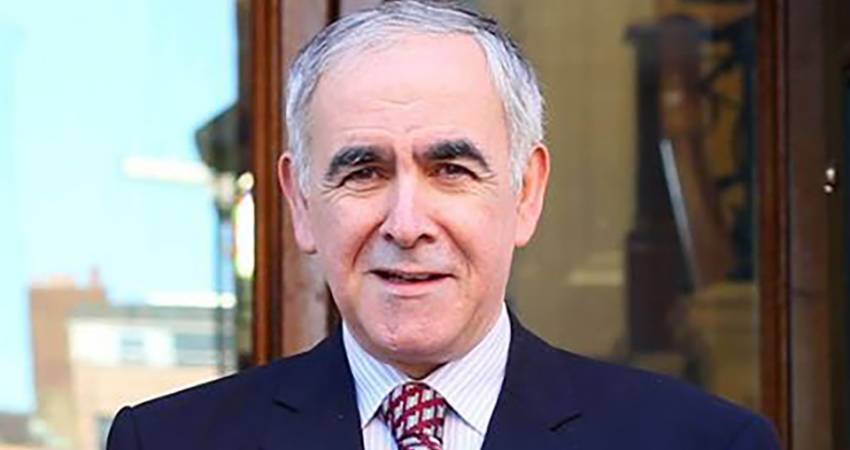
Professor says Medical Council removal of ban on deliberate killing was "under the radar" process
A leading medical expert and ethics lecturer has expressed "great concern" about what he described as the "under the radar process" by which the Medical Council dropped a section of its ethical guidelines which said doctors "must not take part in the deliberate killing of a patient.”
Prof Des O'Neill, a Consultant Geriatrician who is involved in research and teaching on clinical ethics at undergraduate and postgraduate levels, wrote that "the recent removal of the ethical stricture on euthanasia and assisted suicide by the Medical Council in its new ethics guide (ninth edition), without debate and consultation, has troubled many doctors."
In an article in The Medical Independent, Prof O'Neill says that he was prompted by the change to review how it came about, leading him to request the minutes of the ethics committee from the Medical Council.
"The retrieval of these took almost four months and necessitated a Freedom of Information request. The findings were a cause of great concern with regard to the processes, mechanisms, and integrity of ethical reasoning within the Council," he wrote.
The 9th edition of the Guide to Professional Conduct and Ethics, published by the Medical Council in 2023 dropped the section which told doctors "you must not take part in the deliberate killing of a patient.”
Prof O'Shea said that it had been established that clinical ethics, shaped over millenia, were separate from law - as described the phrase of the ethics committee of the Medical Council which stated that “All citizens are required to act within the law therefore medical ethics will be shaped by the law of the land" as "chilling".
"For those who think the Houses of the Oireachtas are going to be a beacon of clear and progressive ethical thinking, the recent referendum debacle should act as a salutary rejoinder," he wrote.
He said that the Medical Council ethics committee "then progressed to an action line" when they said “If an issue is covered by legal provisions, these provisions apply."
He was strongly critical of their approach descripting it as an "ethically impoverished stance".
By this, the committee is saying what is legal is ethical, which has been quoted subsequently as the rationale for dropping the long-standing and well-reasoned ethical stricture on euthanasia and assisted suicide. That this ethically impoverished stance was adopted speaks volumes about either ethical illiteracy or else an unarticulated strategy to remove an important ethical principle from the guide.
Prof O'Neil said the change was "radical" and that the ethics committee had failed "to appropriately communicate this to the wider profession". He wrote:
It is not even clear that this fundamental change was clearly and appropriately articulated to the full members of the Medical Council when they were asked to endorse the working process and outcomes of the ethics committee.
The lack of appropriate communication and signalling affected the 2021 consultation on the ethics guide. As with others, I tendered a submission, unaware as we all were that the Council was adopting an ‘if it’s legal, it’s ethical’ stance. This would have radically altered submissions if this had been known.
He also said that what he described as a "lack of openness" was "compounded" when a wide range of professional bodies – including members of the ICGP, the RCPI, the RCSI, Colleges of Anaesthesiology and Psychiatry, HSE, and National Doctors Training and Planning – were invited by the Medical Council to a consultation on revising the guide in June 2022.
"This would have been an ideal opportunity to expose the topic to debate among a broad range of medical disciplines," he said.
However, "the dropping of the stricture on deliberate killing was one of the few sections (and the most significant change) which was not presented at this meeting," Prof O'Neill revealed.
"That this under-the-radar process should occur when significant public and political debate on euthanasia and assisted suicide was ongoing and prominent is very concerning. Private Members Bills on the topic go back to 2015. Widespread coverage of a full Dáil debate and vote occurred in 2020, near the time of the change in direction of the ethics committee."
He said that the Medical Council needed to consider if they "may have erred in their processes, thinking, and communication" - and added that, in particular, "the Council’s portrayal of concerns about its processes and content as ‘misinterpretation by some’ in this public domain was condescending and dismissive. It is not in the spirit of modern medical openness. Medical bodies and institutions can err just as individual clinicians can."
Lasting damage to the credibility and standing of the Medical Council as a focus for considered ethical reflection would result if the stance and the process was not corrected, the ethics expert said.
Featured
- Calls for inquiry: 108 babies born alive then die after abortion
- Britain: Assisted Suicide Bill ‘will almost certainly fail’
- Every Life Counts: sending love and care for sick babies
- "A step backwards": Jersey has legalised Assisted Suicide
- 8,000 babies saved by Abortion Pill Reversal
- Spain Moves To Restrict Pro-Life Protests Near Abortion Clinics
- Mediums and abortion: a dangerous narrative
- Man jailed for 9 years for forced abortion
- Abortion coercion has arrived in Ireland – the NWC are silent
- Review of at-home abortions 'needed after coercion case'
- French Govt to remind 29-year-olds of biological clock
- Rally for Life 2025



























